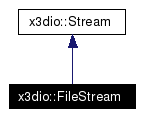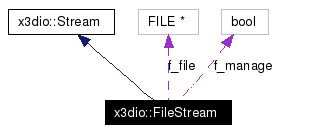
|
X3D libraries
The libraries to work with X3D dataset
|

|
x3dio::FileStream Class Reference
An implementation of the Stream interface to work with standard local files (FILE *). More...
#include <io.h>
Inheritance diagram for x3dio::FileStream:


Public Member Functions | |
| virtual bool | Append (const char *name) |
| bool | Attach (FILE *file, bool manage=true) |
| Attach a FILE * to a FileStream. | |
| virtual bool | Close () |
| Close an I/O stream. | |
| virtual bool | Create (const char *name) |
| FileStream () | |
| Initializes a FileStream. | |
| virtual bool | IsOpen (void) const |
| Check whether a stream is open and can be used for reading and/or writing. | |
| virtual bool | Open (const char *name) |
| virtual int | Read (void *buf, size_t size) |
| Read size bytes from the stream. | |
| virtual int | Seek (long offset, int whence) |
| Move the stream pointer. | |
| virtual bool | Update (const char *name, bool create=true) |
| virtual int | Write (const void *buf, size_t size) |
| Write size bytes of buf to the stream. | |
| virtual | ~FileStream () |
| Cleans up a FileStream. | |
Private Attributes | |
| FILE * | f_file |
| bool | f_manage |
Detailed Description
An implementation of the Stream interface to work with standard local files (FILE *).The FileStream is an implementation of the Stream interface using the local file system (fopen(), fclose(), etc.)
You can Attach() standard FILE * to the stream (such as stdin and stdout) if you wish.
Note that a standard file will be seekable, but many other types of files are not (i.e. a serial device.)
In order to use this class, instantiate an object either on your stack or with new. Then open a file with Open(), Create(), Update(), Append() or Attach(). Finally, Read() or Write() in the file.
char buf[1024]; x3dio::FileStream my_file; my_file.Open("lots-of-secrets.txt"); size = my_file.Read(buf, sizeof(buf)); ...
Constructor & Destructor Documentation
|
|
Initializes a FileStream. The constructor makes sure that the stream is marked as not opened (i.e. IsOpen() will return false). |
|
|
Cleans up a FileStream. The destructor ensures that the file is closed if marked as managed (which is the default.) |
Member Function Documentation
|
|
Open a file in order to append data to it.
Open a file for update, but force all writes at the end of the file (i.e.
Implements x3dio::Stream. |
|
||||||||||||
|
Attach a FILE * to a FileStream. This function can be used to attach a file to a FileStream object. This is useful if you want to use pre-opened files such as stdin and stdout. Set the manage flag to false if you do not want the FileStream to close the file for you. This is certainly very important if the file is stdin, stdout or stderr because some other function will probably be expected to close these streams.
|
|
|
Close an I/O stream. This function will close the file/device which the I/O stream is connected to. The file cannot be accessed again afterward. You can close the same stream multiple times. It will really be closed the first time though. Also, only the first time will the function return true (since afterward it will already be closed.)
Implements x3dio::Stream. |
|
|
Create an output file.
This function creates a file for writing (i.e.
Implements x3dio::Stream. |
|
|
Check whether a stream is open and can be used for reading and/or writing. This function returns true if the Read() and Write() functions can be used on the stream. Note that it does not tell you in which mode the stream was opened. Thus, one of reading or writing may fail when this function returns true.
Implements x3dio::Stream. |
|
|
Open an input file.
This function open a file for reading (i.e.
Implements x3dio::Stream. |
|
||||||||||||
|
Read size bytes from the stream. This function will read up to size byte and put them in buf. The function can return less than size bytes (usually happens at the end of a file or when a network connection is slow and the incoming buffer is never full). If the function returns zero (0), the caller will assume that it reached the end of the file. If no data is available, you should instead return an error. Some I/O implementation may be smart enough to wait and try again later. The implementation of the Stream may want to do that though (using a select(2) call). If an error occurs, the function must return -1 unless some data is available in which case it is authorized to at least return what is available and err on the next call.
Implements x3dio::Stream. |
|
||||||||||||
|
Move the stream pointer.
The function moves the stream pointer using offset and whence to compute the new position. whence is the same as
ftell()). When the stream is a network connection, the stream may return an error if it decides not to support seeking (i.e. no caching and thus no turning back).
Implements x3dio::Stream. |
|
||||||||||||
|
Open a file for update.
Open a file to read and write into (i.e. The file pointer will be set to zero (i.e. at the beginning of the file).
Implements x3dio::Stream. |
|
||||||||||||
|
Write size bytes of buf to the stream. This function tries to write size bytes to the stream.
Implements x3dio::Stream. |
Member Data Documentation
|
|
|
|
|
|
The documentation for this class was generated from the following files:
